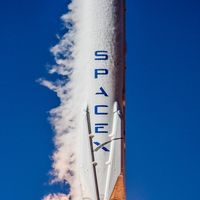Robinhood's Bold Leap: Tokenizing Private Equity in Europe
July 1, 2025, 9:55 pm

Location: United States, California, San Francisco
Employees: 201-500
Founded date: 2015
Total raised: $58.21B

Location: United States, District of Columbia, Washington
Employees: 5001-10000
Founded date: 2002
Total raised: $7.53B
In a world where finance meets technology, Robinhood is making waves. The trading platform has taken a significant step by launching tokenized shares of private companies like OpenAI and SpaceX for users in the European Union. This move is not just a game-changer; it’s a revolution in how everyday investors can access high-profile companies that were once reserved for the elite.
Robinhood's announcement came during a product showcase in Cannes, France. The company revealed that it would allow EU users to trade over 200 U.S. stocks and exchange-traded funds (ETFs) through commission-free tokens. This includes tech giants like Nvidia, Apple, and Microsoft. The tokens can be traded around the clock, five days a week, making investing as easy as ordering a pizza.
But the real headline is the introduction of tokenized shares for private companies. OpenAI and SpaceX are not publicly listed, meaning their equity has historically been out of reach for most investors. Now, thanks to Robinhood's innovative approach, anyone in the EU can own a piece of these groundbreaking firms. This is akin to opening the gates of a previously exclusive club.
To celebrate this launch, Robinhood is giving away 5 euros worth of OpenAI and SpaceX tokens to every eligible user who signs up to trade stock tokens by July 7. The company has set aside $1 million worth of OpenAI tokens and $500,000 worth of SpaceX tokens for this initiative. It’s a generous gesture, designed to entice users into the world of tokenized equity.
The timing of this launch is crucial. Robinhood's stock surged nearly 13% to an all-time high following the announcement. Investors are clearly excited about the potential of tokenized assets. This enthusiasm reflects a broader trend in the financial markets: the growing acceptance of blockchain technology and its applications in trading.
Tokenization is more than just a buzzword. It represents a shift in how we think about ownership. Traditionally, investing in private companies required significant capital and connections. Now, with tokenization, fractional ownership becomes possible. This democratizes access to investment opportunities, allowing everyday people to participate in the growth of innovative companies.
The regulatory landscape in the EU is more favorable for such initiatives. Unlike the U.S., where accredited investor rules can limit access to private equity, the EU has looser restrictions. This means that anyone who qualifies to trade stock tokens can access these investments. Robinhood's executives have emphasized their commitment to reducing inequality in investment opportunities. They aim to level the playing field, allowing more people to participate in the economy.
However, U.S. users will have to wait. Regulatory hurdles remain a significant barrier to bringing tokenized private equity to the American market. The Securities and Exchange Commission (SEC) has strict rules that complicate the introduction of such products. Robinhood's CEO has been vocal about the need for regulatory changes, arguing that blockchain technology could unlock broader participation in private markets.
While U.S. users are left out of the tokenized equity game for now, they are gaining access to crypto staking. Robinhood has reintroduced staking for Ethereum and Solana, a feature that was previously blocked by the SEC. This move signals a renewed push to offer yield-bearing crypto products to American investors. It’s a small consolation, but it shows that Robinhood is still committed to expanding its offerings.
The infrastructure behind this tokenization is also noteworthy. Robinhood is leveraging a new layer 2 blockchain built on Arbitrum. This technological backbone is designed to support the custody and distribution of tokenized shares. It’s a significant investment in the future of trading, positioning Robinhood as a leader in the evolving landscape of digital finance.
The implications of Robinhood's move are profound. By tokenizing private equity, the company is not just expanding its product line; it’s reshaping the investment landscape. This could pave the way for other platforms to follow suit, further democratizing access to investment opportunities.
As the world becomes increasingly digital, the traditional barriers to investing are crumbling. Robinhood is at the forefront of this transformation. The company’s bold leap into tokenization is a testament to the power of innovation in finance. It’s a reminder that the future of investing is not just about stocks and bonds; it’s about access and opportunity.
In conclusion, Robinhood's launch of tokenized shares for OpenAI and SpaceX is a watershed moment in the financial world. It opens doors that were once firmly shut, allowing everyday investors to step into the realm of private equity. As the company continues to push boundaries, it will be fascinating to see how this impacts the broader market. The future of investing is here, and it’s more accessible than ever.
Robinhood's announcement came during a product showcase in Cannes, France. The company revealed that it would allow EU users to trade over 200 U.S. stocks and exchange-traded funds (ETFs) through commission-free tokens. This includes tech giants like Nvidia, Apple, and Microsoft. The tokens can be traded around the clock, five days a week, making investing as easy as ordering a pizza.
But the real headline is the introduction of tokenized shares for private companies. OpenAI and SpaceX are not publicly listed, meaning their equity has historically been out of reach for most investors. Now, thanks to Robinhood's innovative approach, anyone in the EU can own a piece of these groundbreaking firms. This is akin to opening the gates of a previously exclusive club.
To celebrate this launch, Robinhood is giving away 5 euros worth of OpenAI and SpaceX tokens to every eligible user who signs up to trade stock tokens by July 7. The company has set aside $1 million worth of OpenAI tokens and $500,000 worth of SpaceX tokens for this initiative. It’s a generous gesture, designed to entice users into the world of tokenized equity.
The timing of this launch is crucial. Robinhood's stock surged nearly 13% to an all-time high following the announcement. Investors are clearly excited about the potential of tokenized assets. This enthusiasm reflects a broader trend in the financial markets: the growing acceptance of blockchain technology and its applications in trading.
Tokenization is more than just a buzzword. It represents a shift in how we think about ownership. Traditionally, investing in private companies required significant capital and connections. Now, with tokenization, fractional ownership becomes possible. This democratizes access to investment opportunities, allowing everyday people to participate in the growth of innovative companies.
The regulatory landscape in the EU is more favorable for such initiatives. Unlike the U.S., where accredited investor rules can limit access to private equity, the EU has looser restrictions. This means that anyone who qualifies to trade stock tokens can access these investments. Robinhood's executives have emphasized their commitment to reducing inequality in investment opportunities. They aim to level the playing field, allowing more people to participate in the economy.
However, U.S. users will have to wait. Regulatory hurdles remain a significant barrier to bringing tokenized private equity to the American market. The Securities and Exchange Commission (SEC) has strict rules that complicate the introduction of such products. Robinhood's CEO has been vocal about the need for regulatory changes, arguing that blockchain technology could unlock broader participation in private markets.
While U.S. users are left out of the tokenized equity game for now, they are gaining access to crypto staking. Robinhood has reintroduced staking for Ethereum and Solana, a feature that was previously blocked by the SEC. This move signals a renewed push to offer yield-bearing crypto products to American investors. It’s a small consolation, but it shows that Robinhood is still committed to expanding its offerings.
The infrastructure behind this tokenization is also noteworthy. Robinhood is leveraging a new layer 2 blockchain built on Arbitrum. This technological backbone is designed to support the custody and distribution of tokenized shares. It’s a significant investment in the future of trading, positioning Robinhood as a leader in the evolving landscape of digital finance.
The implications of Robinhood's move are profound. By tokenizing private equity, the company is not just expanding its product line; it’s reshaping the investment landscape. This could pave the way for other platforms to follow suit, further democratizing access to investment opportunities.
As the world becomes increasingly digital, the traditional barriers to investing are crumbling. Robinhood is at the forefront of this transformation. The company’s bold leap into tokenization is a testament to the power of innovation in finance. It’s a reminder that the future of investing is not just about stocks and bonds; it’s about access and opportunity.
In conclusion, Robinhood's launch of tokenized shares for OpenAI and SpaceX is a watershed moment in the financial world. It opens doors that were once firmly shut, allowing everyday investors to step into the realm of private equity. As the company continues to push boundaries, it will be fascinating to see how this impacts the broader market. The future of investing is here, and it’s more accessible than ever.

